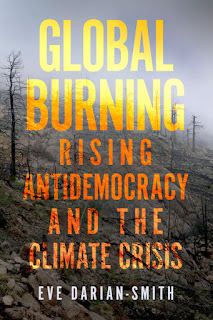 The Global Turn: Theories, Research Designs, and Methods for Global Studies, with Philip McCarty.
The Global Turn: Theories, Research Designs, and Methods for Global Studies, with Philip McCarty.
Darian-Smith applied the “Page 99 Test” to her new book, Global Burning: Rising Antidemocracy and the Climate Crisis, and reported the following:
From page 99:Learn more about Global Burning at the Stanford University Press website.In the United States, the practice of deploying militarized police against citizens on behalf of corporations is also evident in the numerous protests against the Keystone XL Pipeline and the Dakota Access Pipeline which pump enormous quantities of crude oil from Canada into the United States. Beginning in 2011, protests erupted over the laying of pipeline over small farming properties and Native American reservation lands, threatening numerous tribes’ clean water and natural resources. The protestors, known as “protectors” of water and sacred lands, fought for years against possible oil spillage and toxic runoffs, and mobilized a global social movement against the projects. Former president Barack Obama halted both pipelines because of the negative impacts on Indigenous sovereign rights and the environment in 2015. But the Trump administration revived the projects, and protests continued at the Standing Rock Sioux Reservation in North Dakota involving hundreds of tribes and green activists. In 2017 Trump deployed the National Guard, who, wearing riot gear and wielding batons, dispersed crowds in what protestors called “a military style operation.”The Page 99 Test works well for my book. It appears near the start of Chapter 4 on the state-backed violence of environmental racism. The discussion on Page 99 of protests at Standing Rock comes just after a description of India’s extreme-right Prime Minister Modi using violence against people protesting his introduction of Farm Bills that favored industrial-scale agribusiness over small farmers. And it is followed by a discussion of how the conservative government in Australia made up a story about Australian Aboriginal child abuse so it could send military and police forces into their remote townships, and then occupy and lease their lands to mining corporations.
My book connects the global rise of antidemocracy and extreme-right politics with the destruction of the environment. Unfortunately, such destruction disproportionately impacts marginalized peoples and communities of color, be they living in the global south or within wealthy northern nations. I argue that what makes today’s environmental racism different from earlier historical periods is that far-right leaders are now blatantly using military force against their own citizens to secure land grabs and defend the toxic practices of extractive industries. As multinational companies seize lands to build dams, lay pipelines, dig mines, and log forests, local small communities, farmers, and Indigenous groups are often driven from their lands and livelihoods by state troops. The book focuses on out-of-control wildfires in Brazil, Australia, and California in recent years as emblematic of an escalating climate emergency. The catastrophic wildfires share striking similarities in terms of why they occurred, who they impact most, and what they suggest about a global pattern of extreme weather events and the far-right political conditions that foster them.
--Marshal Zeringue



